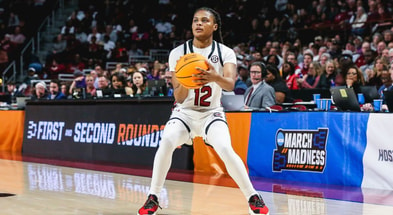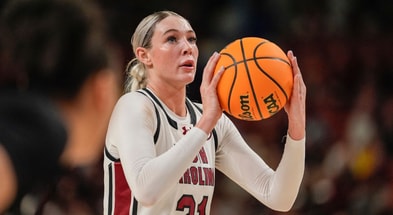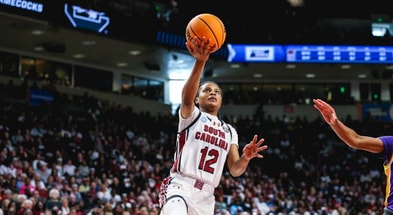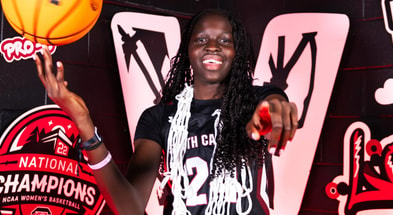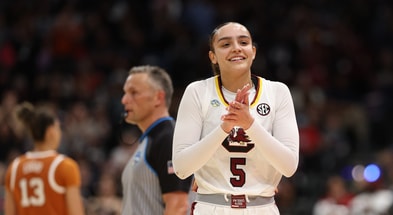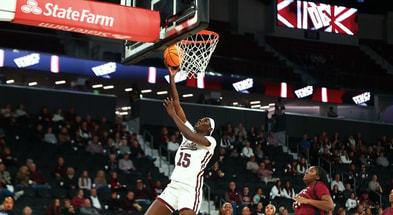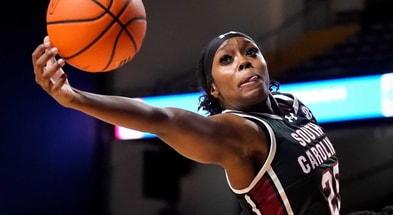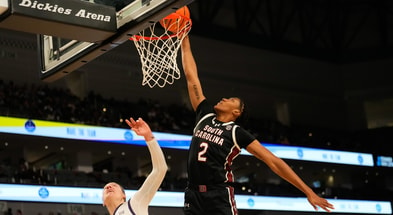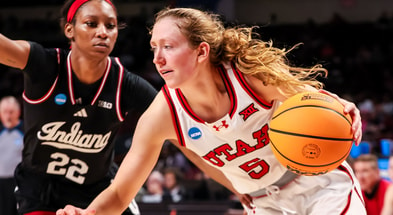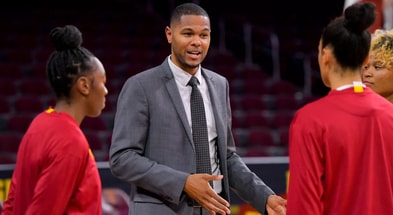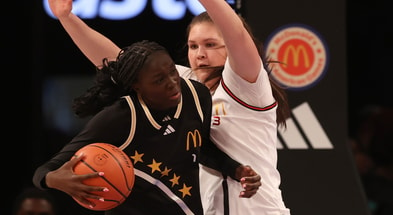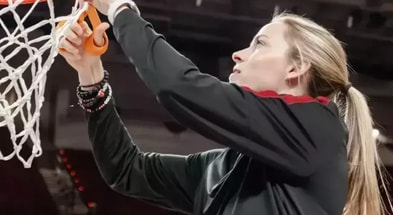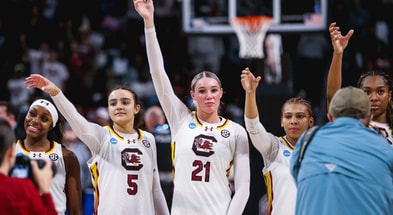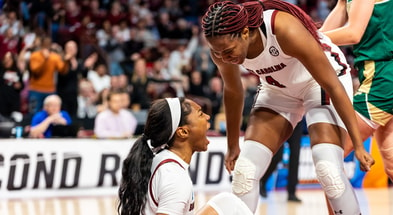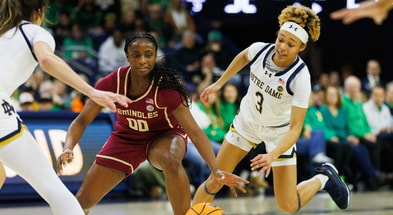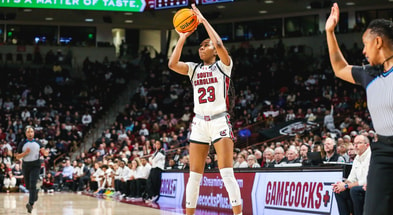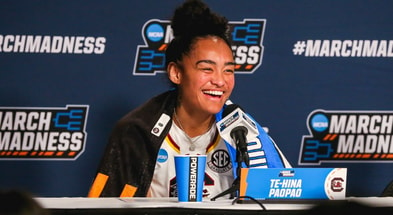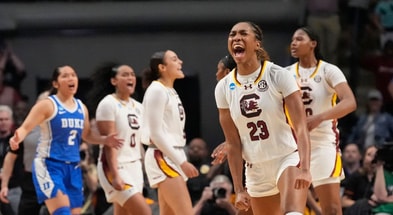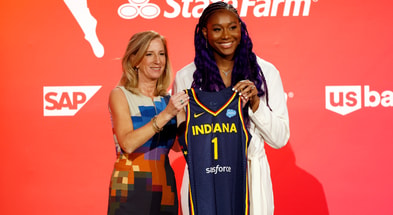South Carolina women's basketball: Previewing Stanford and debating the Gamecocks' dynasty with ESPN's M.A. Voepel
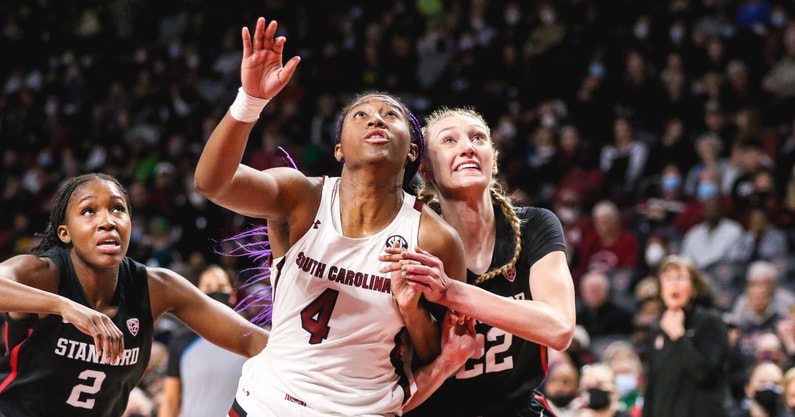
South Carolina Women’s Basketball: News • Recruiting • Schedule • Roster • Stats • SEC • Polls • Scholarships
#1 South Carolina visits #2 Stanford Sunday afternoon for what might be the most anticipated game of the regular season. The Gamecocks and Cardinal are not just the two top-ranked teams, but the two programs have clearly separated themselves from the rest of the country.
It is an enticing matchup between two programs that, although they have only played a handful of times, have an intertwined history. Stanford is one of the original power programs of the sport, with sustained dominance for nearly 40 years, and Tara VanDerveer is one of its true icons. As a player, Dawn Staley lost to VanDerveer twice in the Final Four, including the final game of her career. Staley then played for VanDerveer on the 1996 Olympic team, and VanDerveer became a mentor to Staley.
As they meet again Sunday, the student has arguably surpassed the master. Staley and the Gamecocks have won two of the last five championships and likely would have won a third in 2020 when they were the consensus no. 1 team when the tournament was canceled. They are the favorites to repeat this season, and if they aren’t already a dynasty, they are certainly knocking on the door.
M.A. Voepel has covered women’s basketball for ESPN since 1996. Voepel was honored with the Basketball Hall of Fame’s Curt Gowdy Award in 2022 and is among the most respected, if not the most respected, journalists covering women’s basketball. He was kind enough to offer his insight into South Carolina-Stanford and debate whether South Carolina is already a dynasty.
Predict & Win Free Time: No. 1 South Carolina at No. 2 Stanford
Our conversation has been lightly edited for clarity and length (and to remove a barking dog).
Wellbaum:
With Stanford and South Carolina, obviously the coaches have a lot of respect for each other so there’s no spiciness there, but they seem to bring out the best in each other. And when Dawn first beat Tara in 2017, obviously the stage at the Final Four was huge, but just being able to beat her mentor meant so much to her. Do you think this is a rivalry that really captures people’s attention? Or is it just two great teams going at it and that’s why people want to watch?
Voepel:
I think both. If you love history, this is as chock-full a matchup as you can imagine, just as you said. One of Dawn’s hardest moments of her entire basketball life was losing to Tara’s Stanford team ‘92 in the semifinals. That ended Dawn’s college career. They had played Stanford in ‘90. When you think about how long ago that was that they went head to head, Dawn as player and Tara as coach, what they did to change the sport. I don’t know if you’ve had a chance to see their “Dream On” documentary, but that was so monumental and changing the sport, their relationship there, then Dawn becoming – now the two of them are at the top of their profession in the same profession. You’re just not going to see many stories like that. I don’t think in any sport. We can literally go back to, they’ve had this rivalry, and yet they do really respect each other, they have their different personalities but the two of them represent a lot of history. And then on the other hand, let’s say you don’t know any of that history, you can tune in to see a great game because this is one-two. I think they’re clearly the top two teams in the country. And they have who are probably going to be one-two draft picks if they turn out as projected with Aliyah Boston and Hayley Jones. If you took all the history out, it’s still a great matchup. You add the history in and it’s pretty epic. We hope the game matches that.
Wellbaum:
South Carolina and Stanford are two programs that really couldn’t be more different in terms of Tara’s been there for almost 40 years, and Dawn’s only 52. You’ve got East Coast/West Coast, a coach who’s been around almost since the beginning of the sport versus a player who was not the beginning, but later was one of the establishing players of the game.
Voepel:
Absolutely, and that’s a very fair way to put it, especially if you consider, Tara played in the 70s. She was in that very first wave of women who got scholarships. In terms of the beginning of what we know of women’s college basketball, Tara’s been there for that little thing as a player or coach. So I think that’s an accurate way to put it.
Become a “FAM” Member and support South Carolina women’s basketball players
Wellbaum:
What would you consider to be the defining feature of this current era of women’s basketball, however you want to define that?
Voepel:
I think it’s an interesting time in terms of the teams and have really established themselves, led by South Carolina, in the last, let’s say, decade really, and South Carolina has really done that. It’s a program, it’s risen to the top of the SEC, which is such a tough conference to rise to the top of, and they’ve done it consistently, and there’s no end in sight. So South Carolina has been a really defining team for this era. UConn’s maintained its Final Four streak, but they haven’t won a title since 2016. So they’re still there right at the top. But they haven’t had that final success that they’re so used to having. Stanford has just been a constant for a very long time, they’ve been the most consistent team on the west coast for more than 30 years. So that has stayed a lot the same. They’re still right in the picture. But the other thing we see coming up or programs that some firms that didn’t have much success in the past that are now having more success than others who are having sort of a renaissance, if you will. What we saw last year in the NCAA Tournament was some really legitimate lower-seeded teams, go on good runs and knock off good teams. That is not as rare as people sometimes think it is in the women’s game. The thing that’s still rare in the women’s game, that hasn’t happened now, in a very long time, since 2001, actually, is to have a true major make the Final Four. But we’re seeing mid-majors go all the way up to the Elite Eight. It’s that next step, the last to do it was Missouri State in 2001. So that’s kind of where we are now. It’s a really exciting period because we have very established teams, some I consider sort of the new rich, and some of the old rich, but we definitely have this other group of teams that are bubbling up. And that’s kind of fun to watch.
Wellbaum:
I asked you about how you would define this current era, I would have defined it as parity where we’ve had, five different teams win the last six titles. All the teams like Oregon, Louisville, and NC State coming out of nowhere, almost. But you raise an interesting point that it’s still the same handful of programs that are making all the Final Fours, winning the championships. Do you think the parity aspect is maybe overstated?
Voepel:
No, not really, I think there’s more parity than the game usually gets credit for. And that’s not necessarily new, but because there’s more on television now, there are different outlets with student-athletes being able to “direct-to-consumer,” if you will, because of NIL, I think your assessment of parity is correct. I always go to the men’s game. People talk about the tournament is wild. It is wild. For a few rounds. But look who still ends up in the Final Four most of the time. You have your odd Loyola Chicago, which is a great story, but I mean, look at last year’s final four, that was an all-blueblood Final Four. And that’s generally, for the most part, when you get down to the Final Fours, it’s going to be bluebloods on both sides. What is nice about the women is we’re just two years removed from Arizona, a team nobody thought was going to be going to a Final Four, had never been to one before, in 2021. And that was kind of cool because we had an Elite Eight between two programs with Arizona and Indiana, that had never been to a Final Four. So I think your assessment is correct, that it is an era of parity. But you know what, like in all college sports, bluebloods are still gonna be bluebloods. That’s going to happen in football, it’s going to happen in men’s basketball, women’s basketball, you’re never going to have complete chaos.
Subscribe to Gamecock Central until the 2023 football season for only $10!
Wellbaum:
To borrow your phrase, South Carolina’s kind of nouveau riche, but they’ve sort of changed the way you build a program, build a fan base.
Voepel:
All sports have to have that, you know, the programs that move up and they’re, definitely varying status now. But newer, compared to, Tennessee, for instance.
Top 10
- 1New
Shedeur Sanders prank call
New video/audio emerges
- 2Hot
RG3 hammers NFL execs
Over Shedeur Sanders situation
- 3Trending
Shedeur Sanders
Breaks silence after Day 2
- 4
10 Best Available Players
After Rounds 1-3 of NFL Draft
- 5
Picks by Conference
SEC, Big Ten continue to dominate Draft
Get the On3 Top 10 to your inbox every morning
By clicking "Subscribe to Newsletter", I agree to On3's Privacy Notice, Terms, and use of my personal information described therein.
Wellbaum:
But at least in the SEC, South Carolina is definitely the model. Now, few teams have been able to pull it off, but everyone’s trying to model themselves after what South Carolina has done.
Voepel:
They try to model themselves after what South Carolina has done, or in terms of competitively, they have to be the opposite. Like a Missouri. The way that Missouri tries to play, they’re not going to play South Carolina’s game because they can’t beat them at it. So it’s interesting how South Carolina has influenced teams, not just to sort of mirror them, but also to try to be as much as they could be what South Carolina isn’t. That’s how much influence I think South Carolina has.
Win this “Pubs of Columbia” print from Vista Art
Wellbaum:
Do you think South Carolina is a dynasty at this point?
Voepel:
Yes. The way I would define dynasty now, because we’re not going to have dynasties like the Celtics. I think a dynasty is a team that every single year for, for a decent period of years, you think is a strong national championship contender. South Carolina has been that. I think you can go back to their first Final Four trip in 2015. That’s seven years and eight seasons, and even though they haven’t gone to the Final Four all those years, every year they have a team that conceivably could go, and could have played for a national championship. There are some teams you can say like, well conceivably, you know, however many teams could make it. There’s a difference between conceivably and realistically. South Carolina has realistically been in that in that small group for a significant time plus the recruiting just continues to add. There hasn’t been like a time we thought they were going to run out. Some teams have a window and it’s when they hit the jackpot pot with recruits, but that’s a replenishable thing at South Carolina
Wellbaum:
I think I’m in the unpopular minority around here and I have resisted calling them a dynasty because they’ve only won two titles in six seasons.
Voepel:
I don’t know that you’re wrong, honestly, Chris, because I don’t think there’s a wrong answer to that. Because it kind of depends on how you define dynasty. I guess you’d say the Warriors are a dynasty. I don’t know if we have a dynasty in baseball. Baseball’s had so many different champions. The Dodgers are a dynasty of not getting it. Football, obviously the Patriots had one.
That’s why we’d say if you were like, Hey, I resist that. I don’t think you’re wrong. I think it’s kind of like how to define dynasty and it may be fair to say, South Carolina comes a little closer to submitting that if they win this year. It would be two in a row, which is still pretty rare. Not everybody does the UConn thing and wins four in a row.
Wellbaum:
UConn maybe set an unattainable status for what a dynasty is.
Voepel:
Absolutely. That’s 100% true. This Final Four run when it’s over, I don’t think you’ll ever see that from anybody again, including them. It’s insane that they’ve been, you know, to every Final Four since 2008.
Subscribe (for free) to the Gamecock Central YouTube page!
Wellbaum:
This is a very weird season for covering South Carolina, because as much fun as the Maryland game, the Stanford game, the UConn game in February, as much fun as these games are, none of this matters. It’s all about winning the championship. Last year they had to prove themselves after the heartbreak of 2021, so it was about the process. They don’t have to do that this year. It’s just about the championship.
Voepel:
It’s weird, but it puts them in that UConn discussion because that’s the only other team – well Stanford’s like that a lot but they didn’t win one for 29 years. You always knew they were going to make the Final Four and not win. Whereas South Carolina’s in that realm now. Nobody has had to carry that like UConn, even though that drives people nuts, but that’s just the truth. They really have carried that for a long time. Being in that kind of realm where you know what do we get to celebrate? Do we only get to really celebrate at the end? I like what Dawn has done, how much she has put emphasis on winning the SEC, and why that really matters because it does give the kids those other milestones that really matter to them. It’s kind of cool when they got the rings, they got SEC rings and NCAA rings.
Wellbaum:
And I’m sure she reminded them they only got two (no SEC Tournament title).
Voepel:
Something to keep them humble, right?
#1 South Carolina plays #2 Stanford at 3:00 om ET on November 20 on ABC. My thanks to M.A. Voepel for taking the time to talk and spending considerably longer chatting than I had intended.

